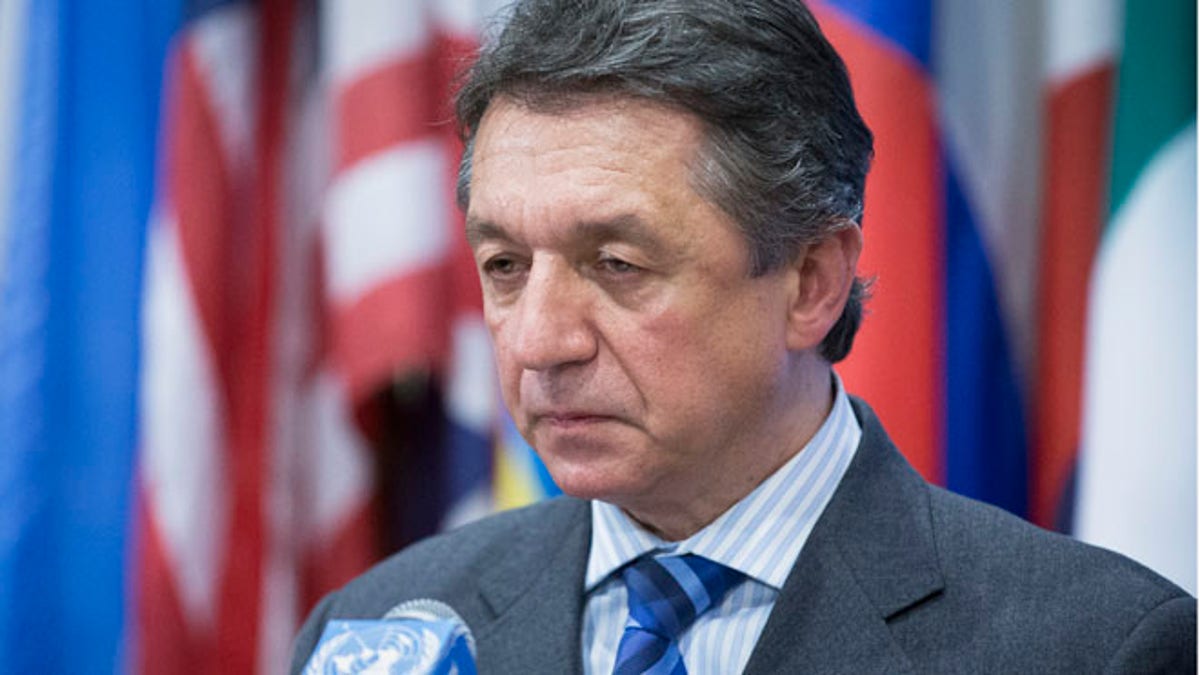
March 1, 2014: Ukraine'sU.N. Ambassador Yuriy Sergeyev at a U.N. Security Council meeting in the United Nations headquarters. (AP)
Ukraine's ambassador to the United Nations asked the Security Council to "do everything possible" to stop Russian "aggression" as the U.N.'s most powerful body met in an emergency session Saturday while Russian troops moved into the Crimean Peninsula.
Despite the pleas by Yuriy Sergeyev, action by the Security Council seems unlikely due to the presence of Russia as a permanent member with veto power. As a result, Russia can block the council from adopting any resolution sanctioning or criticizing Moscow by casting a single "no" vote.
Saturday marked the second consecutive day Security Council members have met to discuss the crisis in Ukraine. After meeting behind closed doors, the 15-member council agreed to hold an open, televised meeting despite Russian objections.
Sergeyev said Saturday that Russia had rejected Ukraine's proposal to hold immediate bilateral consultations and called on Russian President Vladimir Putin to not follow through with talk of military invasion. Sergeyev also called deposed Ukrainian President Viktor Yanukovich "crazy."
When asked later whether Ukraine is at war with Russia, Sergeyev said, "No. We are not at war. We are trying to avoid any clashes. We are being provoked."
U.N. Secretary-General Ban Ki-moon urged Russian President Vladimir Putin in a phone call to "urgently engage in direct dialogue with the authorities" in Kiev.
Calling the situation in Ukraine "as dangerous as it is destabilizing," U.S. Ambassador to the U.N. Samantha Power told the council, "It is time for the Russian military intervention in Ukraine to end."
Power and other members of the council called for sending international monitors to Ukraine as soon as possible to observe the situation, and Power warned that "Russia's provocative actions could easily push the situation beyond the breaking point." She also mentioned work on an international mediation mission to send to Ukraine.
The council took no action.
But the current council president, Luxembourg Ambassador Sylvie Lucas, said members stressed the importance of Ukraine's territorial integrity and the need to lower tensions, in addition to the need for international monitors.
Russia's U.N. ambassador, Vitaly Churkin, said the new government in Kiev needs to get away from "radicals" and warned, "such actions they're taking could lead to very difficult developments, which the Russian Federation is trying to avoid."
Russia has given refuge to Ukraine's now-fugitive president, Viktor Yanukovych, who fled after demonstrations turned violent amid tensions over his decision to turn Ukraine toward Russia, its longtime patron, instead of the European Union.
Churkin said Russia was intervening at the request of pro-Russian authorities in the semi-autonomous Crimea, which is largely Russian-speaking and is home to Russia's Black Sea navy fleet.
British Ambassador Mark Lyall Grant, who called for Saturday's meeting, told reporters after the meeting that `there is no justification for Russia's military activities in the last 48 hours."
Deputy Secretary-General Jan Eliasson called the situation in Ukraine "very difficult and very dangerous" and said they were seeing "negative signs, serious signs, risks of escalation."
The Associated Press contributed to this report.




